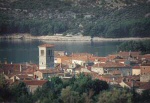 |
 |
|
|
PHILOSOPHY AND EDUCATION IN CONTEMPORARY SOCIETYThe sudden development of science and knowledge, which are to be educationally mediated, in the second half of the 20th century set the formulation of a new educational and general schooling paradigm as an unavoidable requirement, a paradigm according to which the schooling system could now be set up adequately to the personal and social needs of humans of the post-industrial era. The post-industrial generation of humans is required to not only master greater amounts of knowledge than the previous generations, but to also continuously supplement and reformulate this knowledge for the rest of their lives. This is not only so that – in fact, it is the least so that – they could sustain their necessary work efficiency, but also so that they could structure their lives. As far as the education of future scientists is concerned, educating them only at a tertiary level has become insufficient. In order to properly educate them, we must commence at the earliest stages of their schooling. Investments in education have become the most important economic investment in general. While, on the one hand, different interests in education have started to suddenly increase, the diversity and the number of questions related to education – even if we decide to simply neglect to pose and provide an answer to the important question on the nature of education – have diversely surpassed the capacity of pedagogy. Hence, education has justifiably become the subject matter of an increasing number of the sciences. Accordingly, in the second half of the 20th century, we have started to witness the appearance and development of the sociology of education, psychology of education, economics of education, history of education and various other scientific disciplines on education. Yet, with the increase of the number of scientific disciplines inquiring into education, the need for a discipline linking their respective results into a consistent system has also been increasing. This is, however, no longer possible without first answering some fundamental philosophical questions on humanity. Accordingly, the philosophy of education is increasingly shown to be the point of convergence not only of the knowledges of the various philosophical disciplines alone – such as philosophical anthropology, epistemology, ethics, philosophy of science, philosophy of language, etc. – but also of the knowledges of the previous with the knowledges of the various other specific sciences of education. In other words, it has become increasingly obvious that a certain philosophy necessarily lies behind each scientific approach to education. If it is not a philosophy then it is certainly an ideology, which – unlike philosophy – both directs scientific research and influences the interpretation of scientific results without true awareness of the issues involved. This can, somewhat successfully, be opposed by philosophy alone, which – when education is concerned – behaves as a philosophy of education. The 13th Days of Frane Petric, the main theme of which is Philosophy and Education in Contemporary Society , have thus been conceived as a place of encounter of all those who are engaged in research on education from different scientific perspectives, so that together we attempt to consider both the educational needs of the time we live in and the ways in which these needs can best be satisfied in the interest of both the individual and the community. |
